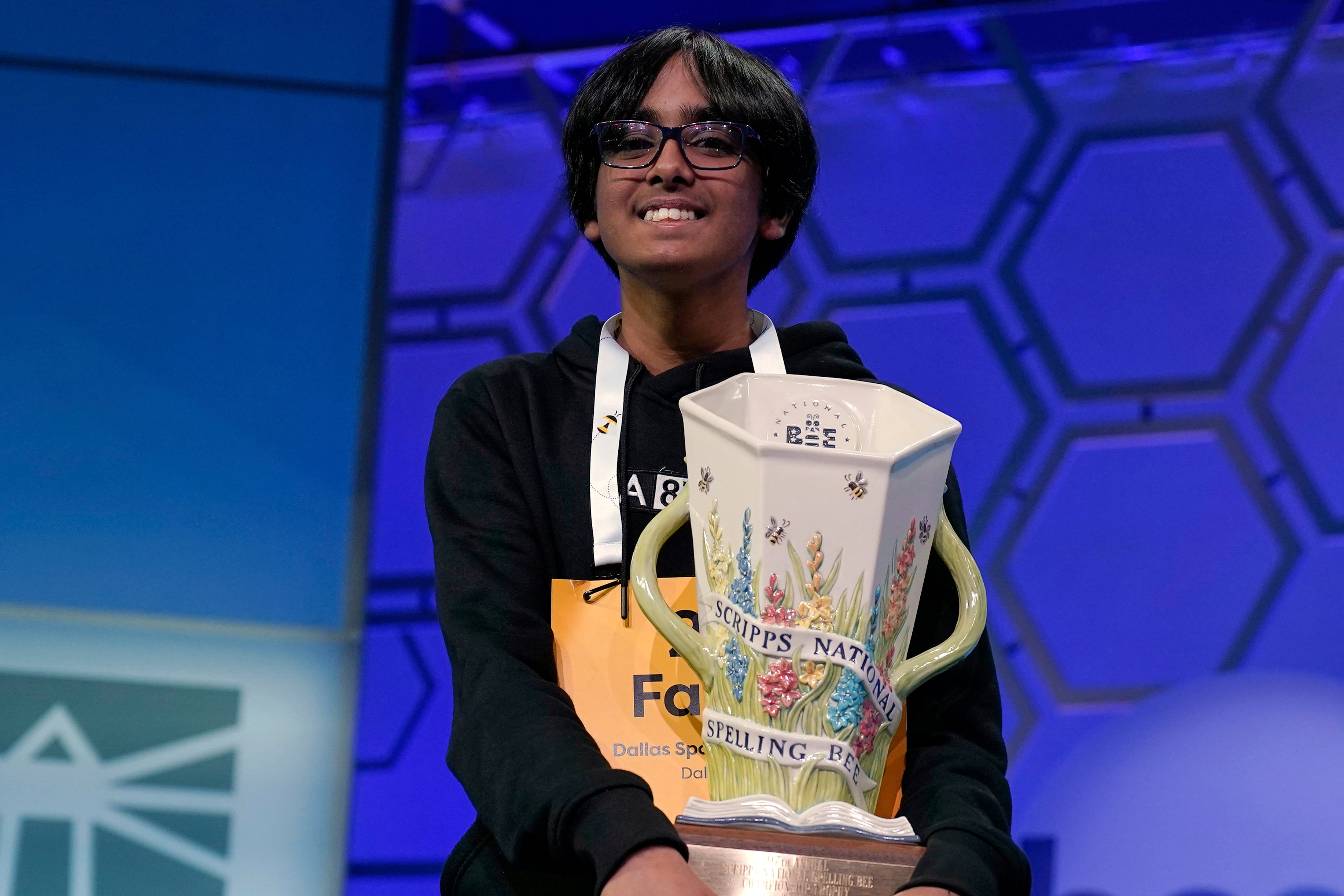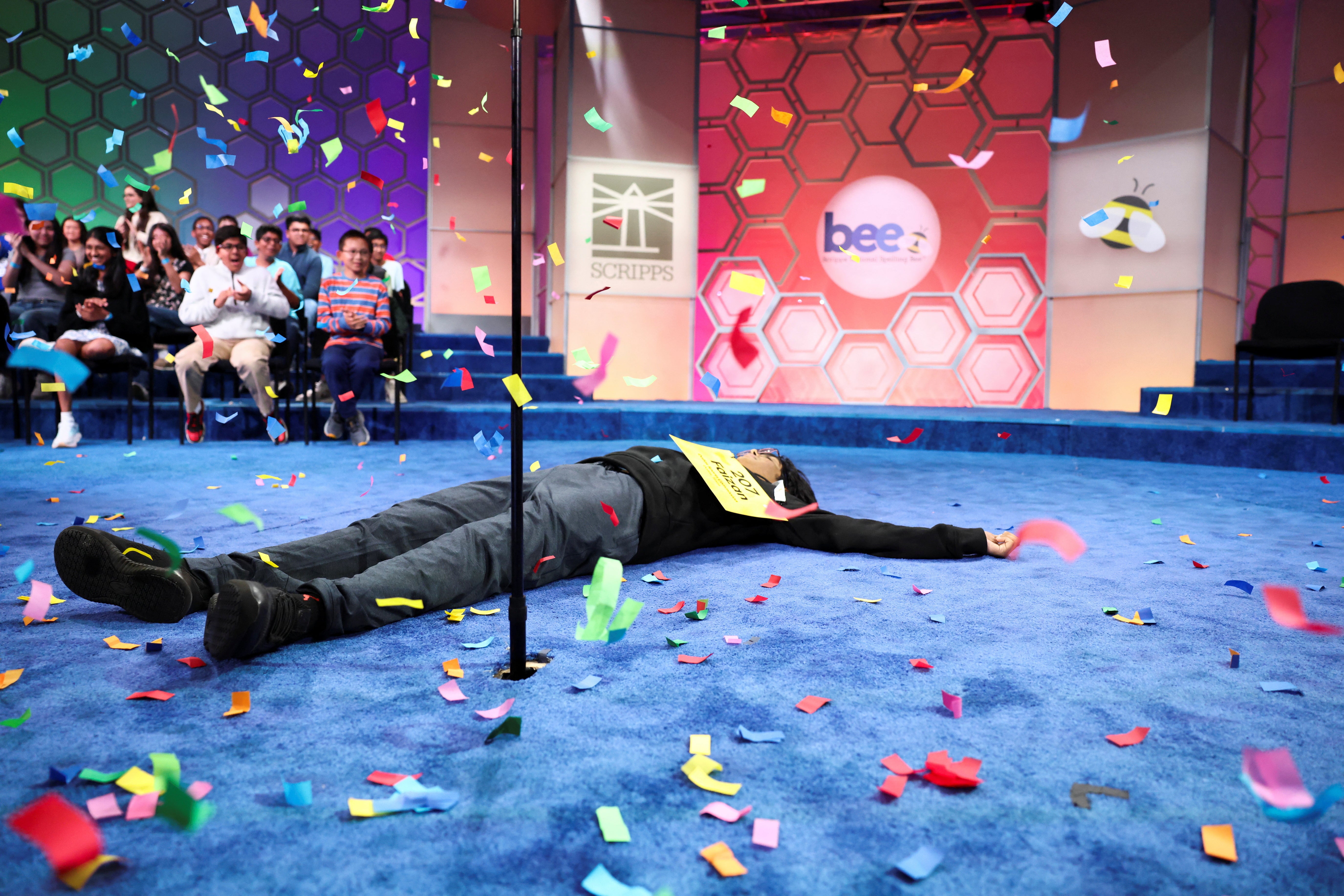This website uses cookies so that we can provide you with the best user experience possible. Cookie information is stored in your browser and performs functions such as recognising you when you return to our website and helping our team to understand which sections of the website you find most interesting and useful.
Thirteen-year-old Faizan Zaki from Plano, Texas, won the finals of the Scripps National Spelling Bee Thursday night with the head-twisting word “éclaircissement.”
His voice began to crack as he neared final letters of his winning word, and he dropped to the floor after nailing it at the Gaylord National Resort and Convention Center in National Harbor, Maryland.
The bee’s executive director, Corrie Loeffler, said the final faceoff had “about the most exciting ending I’ve ever seen,” The New York Times noted.
Last year, Bruhat Soma, 12, from St. Petersburg, Florida, beat Zaki in the second-ever spell-off in the history of the competition. Zaki was the only 2024 finalist to also compete in this year’s final.
The champion takes home a prize of $50,000, with cash rewards also handed to the next five finishers.
Last year, a 90-second spell-off was required for final victory. The tie-breaking round emphasized speed as much as accuracy.
When the fourth round of the 2025 finals got underway, six spellers remained. Thirteen-year-old Akshaj Somisetty, from Harrisburg, Pennsylvania, was ousted in the second round.
The last six spellers in the competition hailed from California, New Jersey, New York, Georgia, Texas, and North Carolina.

The third round saw the departure of Esha Marupudi, 13, from Phoenix, Arizona, after misspelling “aromorphosis,” and Oliver Halkett, 13, from Los Angeles, who was unable to spell “aurore.”
Harini Murali, from Edison, New Jersey, was knocked out in the seventh round after missing “tekke,” a word with Turkish origins meaning a dervish monastery. Similarly, Brian Liu, 13, from Great Neck, New York, was also knocked out after mistakenly using an “i” when spelling “kyah.”
Aishwarya Kallakuri, 14, from Charlotte, North Carolina, departed after not getting “Keighley” quite right.
Many of the words were so challenging that captioning on the livestream of the competition was inaccurate.
The tenth round saw Sarvadnya Kadam, 14, from Visalia, California, misspelling “Uaupés,” a river going through Colombia and Brazil.
The youngest finalist, 11-year-old Sarv Dharavane, left after slipping up on “eserine” in the ninth round.
Zaki had an opportunity to win in the eighth round following mistakes by Kadam and Dharavane. However, he started spelling the word “commelina” with the letters “k-a-m.”
There were several rounds in a row without any mistakes from the spellers during the evening. But things began to change during the seventh round when several spellers left the competition. That left Zaki, Kadam, and Dharavane to fight to the b-i-t-t-e-r end.

The week began with 243 participants from the 50 states as well as Puerto Rico, the U.S. Virgin Islands, and the Northern Mariana Islands. Spellers from the Bahamas, Canada, Germany, Ghana, Kuwait, and Nigeria also took part.
As many as 178 contestants took part for the first time, and roughly 30 percent of the contestants were 14, with the youngest being eight.
Spellers had 90 seconds to correctly spell a word after it had been pronounced. They could ask for a definition, a part of speech the word fit, that the word be used in a sentence, its language of origin, alternative ways of saying the word, or simply for the pronouncer to repeat the word. The official source for the Spelling Bee is Merriam-Webster Unabridged.
The competition began 100 years ago. It was cancelled, however, four times, between 1943 and 1945 because of the Second World War, and in 2020 due to the Covid-19 pandemic.
Mostly due to an eight-way tie in 2019, as many as 109 champions have been crowned over the years, including 56 boys and 53 girls.



 Africana55 Radio
Africana55 Radio 
